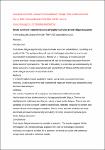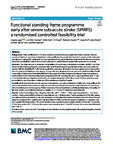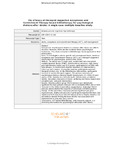Stroke survivors’ experiences and perceptions of post-stroke fatigue education in the subacute phase of stroke. The FASE qualitative study
| dc.contributor.author | Elizabeth Tremayne, J | |
| dc.contributor.author | Freeman, J | |
| dc.contributor.author | Coppola, A | |
| dc.date.accessioned | 2024-02-09T14:02:18Z | |
| dc.date.available | 2024-02-09T14:02:18Z | |
| dc.date.issued | 2021-02 | |
| dc.identifier.issn | 0308-0226 | |
| dc.identifier.issn | 1477-6006 | |
| dc.identifier.uri | https://pearl.plymouth.ac.uk/handle/10026.1/22044 | |
| dc.description.abstract |
Abstract Introduction Post-stroke fatigue significantly impacts stroke survivors’ rehabilitation, morbidity and quality of life. The evidence-base of post-stroke fatigue education is scarce and inconsistently translated to practice. Research is necessary to understand the current provision, impact and perceptions of post-stroke fatigue education from the stroke survivor’s perspective. The aim of this study is to develop an understanding of stroke survivors’ current experiences and perceptions of fatigue and the role of post-stroke fatigue education in subacute stroke. Methods A United Kingdom-based qualitative inquiry using semi-structured interviews involving 10 participants who had experienced subacute stroke was conducted using thematic data analysis. Findings The overarching theme of acceptance and adaptation reflected possible mechanisms in how stroke survivors manage post-stroke fatigue. Theme one highlighted the individual and diverse nature of post-stroke fatigue. Theme two, the variability of stroke survivors’ current experiences, reflected variability in content and context of post-stroke fatigue education. Theme three, the role of stroke services, described perceived responsibility and ability of stroke services to provide post-stroke fatigue education. Conclusions Post-stroke fatigue education is variable in practice. The results suggest further investigation of a stroke pathway approach for post-stroke fatigue education, involving core aspects suitable for a spectrum of stroke survivors with additional components tailored to individual needs. | |
| dc.format.extent | 111-121 | |
| dc.language | en | |
| dc.publisher | SAGE Publications | |
| dc.subject | Stroke | |
| dc.subject | post-stroke fatigue | |
| dc.subject | education | |
| dc.subject | subacute | |
| dc.subject | treatment | |
| dc.subject | occupational therapy | |
| dc.title | Stroke survivors’ experiences and perceptions of post-stroke fatigue education in the subacute phase of stroke. The FASE qualitative study | |
| dc.type | journal-article | |
| dc.type | Article | |
| plymouth.author-url | https://www.webofscience.com/api/gateway?GWVersion=2&SrcApp=PARTNER_APP&SrcAuth=LinksAMR&KeyUT=WOS:000614534100006&DestLinkType=FullRecord&DestApp=ALL_WOS&UsrCustomerID=11bb513d99f797142bcfeffcc58ea008 | |
| plymouth.issue | 2 | |
| plymouth.volume | 84 | |
| plymouth.publication-status | Published | |
| plymouth.journal | British Journal of Occupational Therapy | |
| dc.identifier.doi | 10.1177/0308022620963741 | |
| plymouth.organisational-group | |Plymouth | |
| plymouth.organisational-group | |Plymouth|Research Groups | |
| plymouth.organisational-group | |Plymouth|Faculty of Health | |
| plymouth.organisational-group | |Plymouth|Faculty of Health|School of Health Professions | |
| plymouth.organisational-group | |Plymouth|Research Groups|Institute of Health and Community | |
| plymouth.organisational-group | |Plymouth|REF 2021 Researchers by UoA | |
| plymouth.organisational-group | |Plymouth|Users by role | |
| plymouth.organisational-group | |Plymouth|Users by role|Academics | |
| plymouth.organisational-group | |Plymouth|REF 2021 Researchers by UoA|UoA03 Allied Health Professions, Dentistry, Nursing and Pharmacy | |
| plymouth.organisational-group | |Plymouth|Users by role|Researchers in ResearchFish submission | |
| plymouth.organisational-group | |Plymouth|Research Groups|Plymouth Institute of Health and Care Research (PIHR) | |
| plymouth.organisational-group | |Plymouth|REF 2028 Researchers by UoA | |
| plymouth.organisational-group | |Plymouth|REF 2028 Researchers by UoA|UoA03 Allied Health Professions, Dentistry, Nursing and Pharmacy | |
| dcterms.dateAccepted | 2020-08-01 | |
| dc.date.updated | 2024-02-09T14:02:18Z | |
| dc.rights.embargodate | 2024-2-14 | |
| dc.identifier.eissn | 1477-6006 | |
| rioxxterms.versionofrecord | 10.1177/0308022620963741 |




